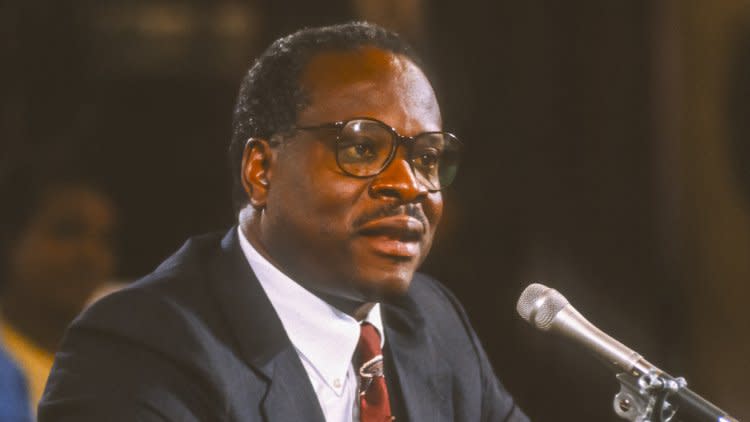Here's What Queer Folks Need to Know About Clarence Thomas' Decision

- Oops!Something went wrong.Please try again later.
Today’s bombshell Supreme Court decision to overturn Roe v. Wade and wipe out 49 years’ worth of “settled law” with little more than a shrug is baffling. But tucked inside it was the commitment of conservative Supreme Court Justice Clarence Thomas to push for even more radical and unfounded reversals.
Specifically, Justice Thomas singled out at least three additional landmark court decisions that he all but vowed to overturn. Not only are these cases all part of the bedrock of our modern civil liberties, but they also all continue to bear extraordinarily high levels of public support.
Justice Thomas wrote:
“The exercise of the rights at issue in Griswold, Eisenstadt, Lawrence, and Obergefell does not destroy a ‘potential life,’ but an abortion has that effect. So if the rights at issue in those cases are fundamentally the same as the right recognized in Roe and Casey, the implication is clear: the Constitution does not permit the States to regard the destruction of a ‘potential life’ as a matter of any significance.”
On days like today, it’s hard not to ask how we ended up at the mercy of secretive unelected judges who decide that the law is essentially whatever they want, regardless of any precedent, legislative will, or public opinion.
Past generations usually lauded the idea that the court is insulated from public opinion. But if modern Americans are left with no choice but to regard the courts as an institution that simply does not represent them, how can such a system survive in the long run?
You don’t have to take our word for it: here are the hard numbers on how far apart our courts and our culture sit.
Roe v. Wade
Doing away with the 1973 decision to secure (mostly) fair and equal access to abortion hardly came as a surprise given the current ring-leaning composition of the court.
Nevertheless, most Americans agree that abortion should be legal, even if the particularities vary.
In March, Pew Research found that 61% of people believed abortion should at least be “legal in most cases,” with 19% proclaiming abortion should be “legal in all cases, no exceptions.” By contrast, only 8% backed a complete abortion ban with no exceptions.
Public support for Roe v. Wade has varied from poll to poll, but always received solid majority support. Mere hours after the SCOTUS announcement, the Brookings Institute noted that about 60% of Americans wanted Roe v. Wade left as is.
Griswold v. Connecticut
Although it is not as famous as Roe v. Wade, the 1965 court decision known as Griswold v. Connecticut is very influential. In a 7-2 decision, the Justices found that married couples had a constitutional right to purchase contraception.
The fact that this was even up for debate seems unthinkable today… and yet, Thomas singled out Griswold among the rulings that he believes require additional scrutiny for whatever reason.
In 1937, Gallup found that 63% of the American public supported free and open access to birth control. Today, that number is up to 92%. Because of course it is.
Lawrence v. Texas
2003’s Lawrence v. Texas decision struck down U.S. sodomy laws – which is to say, anti-sodomy laws, a pretty anachronistic term covering any number of private, consensual sex acts long deemed illegal in certain states.
In truth, these laws were rarely prosecuted by the time the court got around to doing away with them. And yet, they technically still made most LGBTQ+ relationships a criminal act. At the time, Thomas dissented to this decision.
As you can imagine, relatively little public polling is conducted these days specifically on “sodomy,” presumably because pollsters find it hard to interpret fits of giggles or blank stares.
Be that as it may, Gallup finds that 71% of Americans find “gay and lesbian relations” to be “morally acceptable,” while just 25% call it “wrong.”
Thomas’ dissent to Lawrence was on purely technical grounds, calling the law in question “silly” and arguing that Texas legislators should overturn it themselves. Nevertheless, if the court opens the door again to essentially outlaw queer relationships in America, many of the weirdos in our legislatures will try to do it.
Obergefell v. Hodges
Obergefell v. Hodges was the most recent of the decisions that Thomas put on his hit list, and it comes as no surprise. This was the 2015 ruling legalizing same-sex marriage throughout all 50 states and in all U.S. territories.
Thomas never made a secret of how much he hated this ruling. At the time, however, he couldn’t scrounge up four other votes and was stuck griping in the dissent.
In 2015, Gallup found a then-record high of about 60% of Americans saying that such marriages “should be valid.” Since then, the figure has soared up to 71%, as more and more people discovered that same-sex marriage did not herald the end of western civilization. (Imagine that.)

